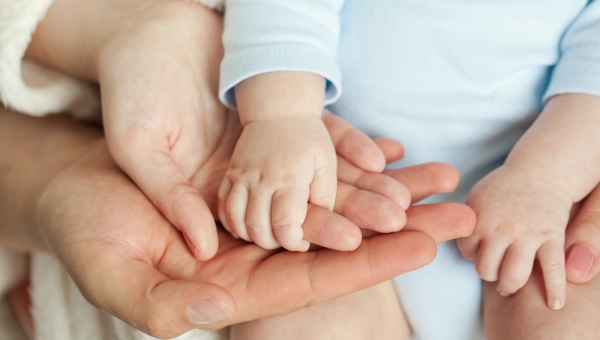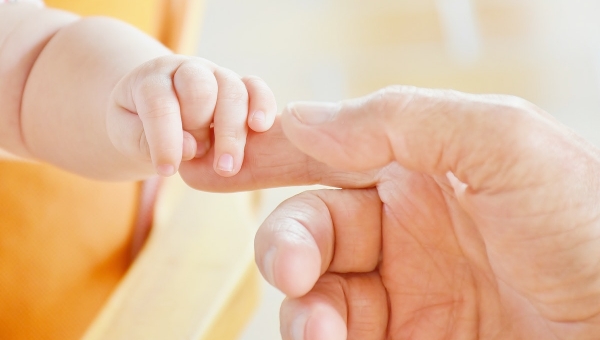
In our previous blog post about the causes of infertility, we explained that it is estimated that 30-50% of couples are struggling to get pregnant due to male infertility. In other cases, though, both the man and the woman are struggling with infertility. In both scenarios, using a sperm donor is a viable option to get pregnant and deliver a healthy baby. Here is how sperm donation works and whether it might be right for you.
The Process of Using Donor Sperm to Overcome Infertility
Fertility Testing
Before undergoing any treatment at our North Houston fertility clinic in The Woodlands and Kingwood, couples should undergo fertility testing. This will tell you, your physician, and our team what is causing your infertility, and if infertility is, in fact, the reason why you and your partner are struggling to conceive. Whether you should consider sperm donation or other fertility treatments will depend on what the results show.
Look Into a Sperm Bank
If sperm donation does turn out to be a good option for you and your partner, our fertility doctors will help you locate FDA-approved sperm banks. Through this sperm bank, you will pick an anonymous donor from a book, which will give you information on appearance and other details.
Egg Fertilization
Once you’ve taken the time to select a sperm donor, we will proceed with fertilizing the woman’s egg, but don’t worry–the sperm is thoroughly washed so as to prevent infection.
How we go about fertilizing will vary. For example, if you choose IUI (Intrauterine Insemination), our fertility specialists will inject the semen directly into the uterus. If, on the other hand, you choose North Houston IVF (In Vitro Fertilization), then we will fertilize the egg outside of the body with the semen. This may be done in the even that sperm has a hard time reaching the egg because of female infertility. Once it becomes an embryo and reaches the day 5 (blastocyst) embryo stage, we will implant it in the woman’s body.
HART Fertility Clinic in The Woodlands and Kingwood Will Offer Support, Guidance, and Education
Our North Houston fertility specialists take pride in helping couples conceive and deliver healthy babies. If you are considering using a sperm donor for IVF or IUI, then please request an appointment so we can get started with fertility testing and deciding on a viable treatment plan. We look forward to supporting you and guiding you the entire way.

Infertility, though most commonly associated with women, can also occur in men. In fact, it is estimated that 30-50% of couples experiencing infertility are doing so because of male infertility. However, this does not mean that either partner is to blame. In fact, when experiencing infertility, being united as a couple is crucial and the best way to surpass it. Here are some possible causes of infertility in couples.
Causes of Infertility in Men
Men may experience a low sperm count, which is considered less than 15 million. Poor sperm mobility is another cause of infertility, which means the sperm have a hard time getting to the egg. A third cause is abnormal sperm shape, as incorrectly shaped sperm also struggles to reach the egg. Abnormal semen, which is the fluid that helps transport the sperm to the egg, would also result in his sperm ineffectively reaching the egg.
Now, what causes abnormal sperm and semen? There are many possibilities, such as a medical condition, hormonal imbalance, disorders, and even genetic factors. For example, men should have an X chromosome and a Y chromosome, but in the case of Klinefelter’s Syndrome, which occurs in men with two X chromosomes and a Y chromosome, he will have low testosterone count and sperm count. In some cases, they may produce no sperm. Radiation therapy, anemia, diabetes, excessive consumption of alcohol, mental stress, and Cushing’s Syndrome may also cause male infertility.
Causes of Infertility in Women
Infertility in women is often caused by issues with ovulation, fallopian tubes, the uterus, or the cervix. If the uterus or fallopian tubes are facing some type of damage, then the egg will have a hard time traveling from the ovary to the uterus.
What can cause these problems, though? Much like with male infertility, there are plenty of possibilities. Some causes include premature ovarian failure and Polycystic Ovary Syndrome (PCOS), which may cause ovulation to not occur at all. Chemotherapy, radiation therapy, anemia, thyroid problems, eating disorders, and mental stress may also cause female infertility. Yet another common cause of infertility is endometriosis, a condition in which cells that are supposed to be in the lining of the uterus grow somewhere else.
Treatments for Infertility at our North Houston Fertility Clinic
The many different causes of infertility may seem worrisome, but the good news is that there are plenty of treatments and alternatives for both men and women. At HART Fertility in The Woodlands and Kingwood, we offer IVF (In-Vitro Fertilization), but our fertility specialists also offer IUI (Intrauterine Insemination), and more to help couples conceive and give birth to a healthy baby. If you would like to learn more about fertility treatments, then please request an appointment with our fertility doctors at our Kingwood fertility clinic or our fertility clinic in The Woodlands. First, we will have you undergo fertility testing so that our doctors get a better understanding of what’s causing your infertility. This also helps us determine if you would best benefit from IVF or other treatments.

People are far more open about the once-taboo topic of infertility. This can be attributed to the ever-growing conversation around it, especially because more couples are waiting to have children. When you first embark on your fertility journey, the first step is to get tested. But when should couples get tested to find out if infertility is, in fact, what’s causing them to have a hard time conceiving and giving birth? Here is what our North Houston IVF specialists recommend.
Fertility tests can be conducted in a number of ways, and they help doctors determine whether a couple is facing infertility, what is causing it, and what are the best options for them going forward.
When Should I Get Fertility Tests Done?
We understand how frustrating it may be to not get pregnant soon, but keep in mind it can take up to a year to finally get pregnant. If you and your partner have attempted to get pregnant for over a year with no results, then it may be time for both of you to get tested so you can better understand what’s going on.
If you are a woman over 35 and have had no success getting pregnant for 6 months, then you may consider infertility testing as well.
How Do Fertility Tests Work?
A fertility test starts out with your doctor asking you and your partner about your medical and sexual histories and then completing a physical. Following this, the doctor may test a woman’s eggs, uterus, and fallopian tubes with a pelvic exam and ultrasound.
For men, their sperm and semen may be evaluated through a semen analysis, which will give the doctor insight on sperm count, sperm quality/shape/size, sperm speed, and the amount of seminal fluid.
Finding the answer as to why a couple is facing infertility may take time. In the event that the answer isn’t found with these exams, there are additional exams that may be administered. Our fertility specialists in Kingwood and The Woodlands want to assure you that there is no need to get discouraged. Infertility is complex, but there are ways for us to help you mitigate it and we fully intend on supporting you the entire time.
Once I Learn Why I’m Infertile, What’s Next?
The type of fertility treatment plan we recommend to you will depend on the test results. We may recommend In Vitro Fertilization (IVF), Intrauterine Insemination (IUI), or other, less common (but still effective) treatments.
HART Fertility in North Houston Is Committed to Helping Infertile Couples
Whether you are in or near Kingwood or The Woodlands, our North Houston fertility clinic is committed to helping you and your partner conceive and give birth to a healthy baby. If you would like to pursue fertility treatment, then please request an appointment with our IVF specialists. We will work with you to determine which fertility methods may work best for you and your partner.

These days, infertility is slowly becoming less taboo to talk about and we are proud to contribute to the conversation. This is why we decided to gather some of the most common questions we get when it comes to discussing North Houston IVF fertility treatment in The Woodlands and Kingwood. With this FAQ, we hope to shed some light on your concerns prior to visiting us.
When Should I Consider IVF Fertility Treatment?
Getting pregnant can take longer than others for some, but it does not necessarily mean one of the partners is infertile. If you are feeling concerned because you think it's taking too long, our fertility specialists recommend you speak to your doctor about it before anything else. When you speak with your doctor, he or she will first ask about your medical and sexual history, as well as that of your partner's. Next, tests such as semen analysis, fallopian tube evaluation, and ovarian reserve tests will be administered. Gathering this information helps your doctor determine if infertility is indeed the case and what exactly is causing it. Afterward, your doctor will walk you through all of your options and let you know if IVF treatment is recommended.
How Likely Is It That My IVF Baby Will Have Birth Defects?
Unfortunately, some believe that undergoing IVF increases your baby’s chances of being born with birth defects, but research suggests there are other factors besides IVF that may cause this. There is no significant difference between non-IVF and IVF babies having chances of being born with a defect.
If you are still worried though, rest assured that after we allow your fertilized eggs to grow to the blastocyst (day 5 embryo) stage, we complete Preimplantation Genetic Testing to determine which embryos are more likely to become healthy babies at birth.
Does IVF Take All Of My Eggs?
This is a common hesitation, but it is not true at all. When a woman ovulates, the ovary picks one egg out of hundreds and through a natural process known as atresia, the rest of the eggs that were not selected die, and this is a completely normal process.
In order to successfully undergo IVF, you must take fertility medication, which stimulates the ovaries to produce more eggs. This cancels out the natural selection of your ovaries and also prevents the death of your eggs. Although “death of your eggs” sounds bad, this is normal and it is important to remember that women have anywhere between 300,000 and 400,000 eggs once they hit puberty.
Get an Opinion From One of Our Fertility Specialists in North Houston
If, after your doctor has conducted tests, IVF is recommended to you, then please request an appointment with our specialists in The Woodlands and Kingwood so we can further discuss any concerns and questions you may have. Throughout your fertility journey, a strong support system will be crucial, so we look forward to developing a close relationship with you.

For some, the journey of infertility can be quite difficult and life-changing. Whether it be the cost of treatment, the struggles of failed pregnancy outcome or the emotional and psychological toll associated with a couple’s desire to conceive, it is important to highlight resources available to help assist individuals through these challenging times.
Financial limitations are the most common issue that patients in our community face when deciding their treatment plan. Fortunately, over time, the feasibility and success of treatment have made it easier to decide the best choice for you and your future family. Not only has scientific advancement improved treatment success per cycle, but a variety of financing options exist to assist individuals in attaining their reproductive goals. The HART Fertility Clinic has partnered with a few groups to provide our patients with options when considering financial assistance to help reduce the financial burden of treatment. These options can be found using the following link: https://www.hartfertility.com/financial-services. In addition, fertility insurance options also are available to ensure that the cost of fertility treatments can be recovered when met with a failed pregnancy outcome. To determine if you qualify for these benefits, please visit https://vitalitysolutions.com/quote.
Studies have shown that infertility can lead to higher levels of stress, depression and anxiety than that which is seen in the general population. Whether or not mental stressors can affect infertility or treatment outcomes is still up for debate. Counselling has however shown to help improve mental health status. Group therapy has also helped to improve outcomes and patients are able to find support in other individuals or couples who may be facing similar situations. HART Fertility Clinic is dedicated to providing you with all of the support resources you may need. Our providers can offer you advice and recommendations for local mental health professionals, individual therapy providers or group therapy sessions available to you.
Attempts at family building through assisted reproductive technologies can be a roller-coaster ride of hope and loss and hoping once again. Although the success rates of fertility treatment today are better than ever before, they may still fall short for the older infertile woman or infertile couples with more severe or unusual health issues Sometimes these medical advancements require further assistance. In some cases, the use of donor egg, donor sperm or a gestational carrier is necessary. Our providers discuss all potential options with you and help you navigate your way to reach your family building goals. Our community psychologists help to ensure that you are prepared and counsel patients on a personal and individualized level. Individual, couple and group sessions are a great avenue for intended parents to be prepared and fully informed.
Overall, public awareness of infertility and the way it affects patients and their current and future families is growing. As physicians and patients, legislation regarding reproductive access to infertility treatments at both a state and federal level directly affects us. Currently, only 15 states have laws requiring insurance coverage for infertility treatment and of those 15, only nine states require payment for IVF services. Texas law requires group insurers to offer coverage of IVF. Employers may choose whether or not to include infertility coverage as part of their employee health benefit package. (Texas Insurance Code, Article 3.51-6). Despite state laws, some companies have begun to take a proactive part in providing infertility benefits to their employees by voluntarily adding this benefit to their own group health insurance policies through a third party fertility insurance carrier called Progeny. Prior to your consultation visit, our office will call your insurance provider to determine your benefits for you. Coverage of specific procedures are discussed to ensure you have information to determine which treatment plans are right for you and your reproductive goals.
Schedule an appointment to see one of our physicians to discuss your reproductive goals. If you have any questions, please contact our coordinators Monday through Friday, 7:30 a.m. – 3:30 p.m. at (281) 444-4784.




